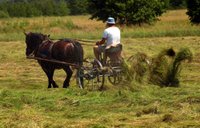 In Romans 6:15-23, Paul presents a rhetorical question, "should we sin since we will be forgiven anyway?" The answer? A definite "no".
In Romans 6:15-23, Paul presents a rhetorical question, "should we sin since we will be forgiven anyway?" The answer? A definite "no".Following that, Paul presents his case using the slave metaphor and in doing so he places it as two sides in juxtaposition of one another:
oooooooooooooooooooooiiilaw <> grace
oooooooooooooooiiislave to sin <> slave to obedience
ooooooooooooooooooooideath <> righteousness
iislave to impurity & wickedness <> slave to righteousness
not controlled by righteousness <> controlled by righteousness
ooooooooooooooooooooooooo<> set free
ooooooooooooooooooooooooo<> slave to God
ooooooooooooooooooooooooo<> eternal life
oooooooooooooooooooiiwages <> gift
As to the using of slaves as a metaphor, the message may not be that strong for us compared to Paul's time when slavery were practised. Although Paul is no anarchist, he uses the metaphor for the easy understanding of the hearers, but qualifying himself by explaining that he is speaking on humans due to their limitations.
Slavery implies a person who is totally subjected to the will of another. He does not have a will of his own, but is in control of another person: here is where sin, impurity and wickedness is personified. A person who is a slave to them will be in their total control. On top of that, slavery is for service, they perform work. In this sense, a slave to sin and wickedness would render the person to perform acts "required" by sin and wickedness.
However, if a person is slave to obedience, righteousness and to God, he will be in total control of these, and doing work that is characteristic of them.
Take that in light of the parable Jesus told, as recorded in Matthew, it strongly reminds us to be certain of whom we serve, and whose slaves we are.
"Beware of false prophets, who come to you in sheep's clothing but inwardly are ravenous wolves. You will recognize them by their fruits. Are grapes gathered from thornbushes, or figs from thistles? So, every healthy tree bears good fruit, but the diseased tree bears bad fruit. A healthy tree cannot bear bad fruit, nor can a diseased tree bear good fruit. Every tree that does not bear good fruit is cut down and thrown into the fire. Thus you will recognize them by their fruits. "Not everyone who says to me, 'Lord, Lord,' will enter the kingdom of heaven, but the one who does the will of my Father who is in heaven. On that day many will say to me, 'Lord, Lord, did we not prophesy in your name, and cast out demons in your name, and do many mighty works in your name?' And then will I declare to them, 'I never knew you; depart from me, you workers of lawlessness.'
~Matt 7:15-23 (ESV)
Maeghan
Picture by Griszka Niewiadomski

Wonder if any of you can help me out here with html ... I have no idea how to space words out. The spacebar does not work much in html.
ReplyDeleteSorry still learning. Good luck.
ReplyDeleteSorry, Maeghan, I not a clue on such things...
ReplyDelete-doug
Maeghan,
ReplyDeleteI would have to say that I am a slave to the mortgage on my home. In light of that, all of Paul's references apply, even in these modern times! :)
God Bless
-Doug
Nevermind about the html :) i think i am giving up trying.
ReplyDeleteDoug,
ReplyDelete:) you can say that again ... it is the same over here.